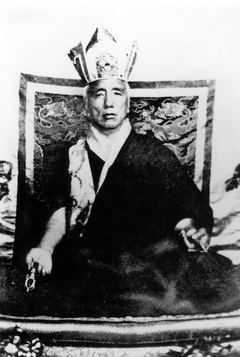On Avoiding Criticism of the Guru
On the Importance of Avoiding Criticism of the Teacher[1]
by Jamyang Khyentse Chökyi Lodrö
As master and students, we have an extensive Dharma connection through empowerment. Therefore, to develop wrong view or feel disdainful would constitute a grievous fault in this and all future lives and would lead to an experience of severe effects. As the Tantra of the Empowerment of Vajrapāṇi[2] says:
"Blessed One, what is the fully ripened effect for those who criticize the master?" The Bhagavan replied, "Vajrapāṇi, this would terrify the whole world, including the gods. It is not to be spoken of, and yet, Lord of Secrets, I shall say just a little. Brave one, listen attentively. Those unbearable hells for the boundless crimes and so on, which I have already explained—it is to such places that they will go. And they will remain there for infinite aeons. Therefore, never, under any circumstances, show contempt for the teacher."
The Fifty Verses on Guru Devotion says:
Those utter fools who criticize the master
Will fall prey to epidemics, leprosy, or disease,
To harmful influences, plagues or poison.They will be killed by rulers,
Fires, snake venom, drowning,
Sky-farers, thieves, negative forces,
Or corrupting influences and led to the hells.Never under any circumstances do anything
That might disturb the minds of the masters.
If you should do so out of foolishness
You will surely be destroyed in hell.[3]It has been clearly explained that
It is in such terrifying hells as Avīci,
Which have already been described,
That those who criticize the master will remain.[4]
Buddhajñānapāda’s Oral Tradition of Mañjuśrī says:
If anyone shows contempt
For a future Vajradhara,
Such a person disrespects me,
And I will forever forsake them.[5]
From Introduction to the Bodhisattva’s Way of Life:
And those who develop feelings of hostility
Towards these benefactors, the buddhas’ heirs,
Will languish in the hells, the mighty Sage has said,
For aeons equal to the moments of their malice.[6]
Such faults are taught extensively in all the sūtras and tantras. It is only right, therefore, that those who seek what is good should adopt and avoid actions accordingly.
If there is significance to this exertion in the means of extending life,
Undertaken with altruistic intention as pure as mountain snow,
May the guru, Three Supreme Jewels, the victors and their heirs,
Grant, here and now, the flowers of virtue, excellence and auspiciousness!
May guru and disciples remain inseparable, with unimpaired samaya,
Accompany one another until reaching the essence of awakening,
And may teacher and retinue become indivisible in wisdom intent
Within the pure realm of Akaniṣṭha Ghanavyūha.
Kyema!
Some, whose minds are wild and deceitful,
Profess to having faith in the guru,
While actually ignoring his commands,
Avoiding deeds that might cause delight,
And doing much that is displeasing.
Cast aside all such insincere assertion.
It’s been said that serving the guru
Is a way to fulfil one’s own goals.
This is to be considered and understood
In relation to the lives of Tilopa and Nāropa.
The lord of Dharma Sakya Paṇḍita
Also said in a prayer of aspiration:
"Abandoning all that brings displeasure,
May I carry out your activity!"
Since it is said that
The guru from whom one receives empowerment,
Even if he resembles a mangy dog, should be revered at the crown,
I think we should heed whatever the guru might say.
Still, there are those who talk of the guru
While cherishing their own deep-seated desires.
Such deceitful, hypocritical devotion
Is pointless, a thing to be cast aside.
This was spoken by Chökyi Lodrö.
| Translated by Adam Pearcey with the generous support of the Khyentse Foundation and Tertön Sogyal Trust, 2022.
Bibliography
Tibetan Edition
'Jam dbyangs chos kyi blo gros. 'Jam dbyangs chos kyi blo gros kyi gsung 'bum. 12 vols. Bir: Khyentse Labrang, 2012. W1KG12986 Vol. 8: 401–403
Version: 1.1-20230608
-
The original text is untitled; this title has been added by the translator. ↩
-
Vajrapāṇyabhiṣeka (Toh 496) ↩
-
Most versions have "cooked/roasted" ('tshed) in place of "destroyed" ('chom), but here the translation follows the text as it appears in Jamyang Khyentse’s collected writings. ↩
-
11–14 ↩
-
Dvikramatattvabhāvanānāmamukhāgama (Toh 1853) ↩
-
Bodhicaryāvatāra I, 34 ↩
